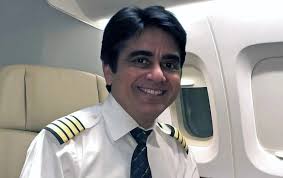Air India Pilot Exonerated by Supreme Court: A Dangerous Precedent for Accountability in Aviation Safety?
In a landmark ruling that has stirred significant debate, India’s Supreme Court has declared that the pilot involved in the recent Air India crash is not to blame for the disaster, a statement that raises serious questions about accountability in the aviation industry. The incident, which involved a Boeing 787 Dreamliner, resulted in the tragic loss of lives and has left families grappling with the aftermath of the tragedy. The decision by the highest court in the land has ignited discussions about the implications for pilot responsibility and the broader safety protocols within the airline industry.
The crash, which occurred during a routine flight operation, saw the aircraft carrying 242 individuals on board. While the court’s ruling may provide some solace to the pilot’s family, it simultaneously casts a shadow over the safety measures and operational standards upheld by Air India and similar carriers. The ruling highlights the ongoing tension between corporate accountability and individual responsibility, a theme that resonates across various sectors, including aviation, healthcare, and public safety.
The Supreme Court’s decision came as a response to the pilot’s father, who expressed concerns about the burden of blame placed on his son. The court’s message was clear: the crash report did not insinuate any wrongdoing on the part of the pilot. However, this assertion raises pivotal questions about the thoroughness of safety investigations and the role of human error in aviation accidents.
Historically, aviation safety has evolved through rigorous standards and regulations designed to minimize human error and enhance operational reliability. The aviation industry is one of the most regulated sectors globally, with organizations like the International Civil Aviation Organization (ICAO) setting stringent guidelines for pilot training, aircraft maintenance, and operational protocols. When accidents occur, investigations aim to uncover the root causes, which often include a combination of mechanical failure, human factors, and organizational shortcomings.
The Air India crash report’s findings, which the Supreme Court deemed insufficient to implicate the pilot, reflect a growing trend in aviation safety investigations. There is an increasing recognition that systemic issues, including corporate culture and management practices, can significantly influence operational safety. This acknowledgment is crucial, as it shifts the focus from individual blame to a more comprehensive understanding of the factors contributing to aviation incidents.
In the wake of this ruling, industry experts warn that exonerating pilots too readily could set a troubling precedent. If accountability is diluted at the individual level, it may lead to complacency in addressing the underlying issues that compromise safety. The aviation industry thrives on a culture of accountability, where every stakeholder, from pilots to airline executives, must be vigilant in ensuring passenger safety. A systemic failure to uphold this culture could have dire consequences.
Moreover, this ruling could embolden airlines to adopt a more lenient stance towards safety protocols, thereby increasing the risk of future incidents. The fear is that corporate interests may overshadow the imperative of maintaining high safety standards. The implications extend beyond Air India; they touch upon the entire aviation industry, where passenger safety is paramount.
In the broader context, this ruling also reflects a societal tendency to seek simple explanations for complex problems. Accidents often result from a confluence of factors, and assigning blame to a single individual can obscure the multifaceted nature of such events. The challenge lies in fostering a culture where learning from failures is prioritized over scapegoating individuals. This approach is essential for the continuous improvement of safety standards in aviation and other high-stakes industries.
As discussions continue to unfold regarding the Supreme Court’s ruling, the families affected by the crash are left to navigate their grief while grappling with the implications of the judicial decision. The emotional toll of such tragedies is profound, and the quest for justice often intersects with the desire for accountability. The court’s statement, while intended to relieve the pilot’s family of undue burden, may inadvertently complicate the narrative surrounding aviation safety and responsibility.
The aviation community now faces a critical juncture. Will this ruling galvanize a renewed focus on systemic safety improvements, or will it foster an environment where individual accountability is overshadowed by corporate interests? The answers to these questions will shape the future of aviation safety and the trust that passengers place in airlines. As the industry strives to maintain its reputation for safety, the lessons learned from this incident and the court’s ruling will undoubtedly resonate for years to come.

